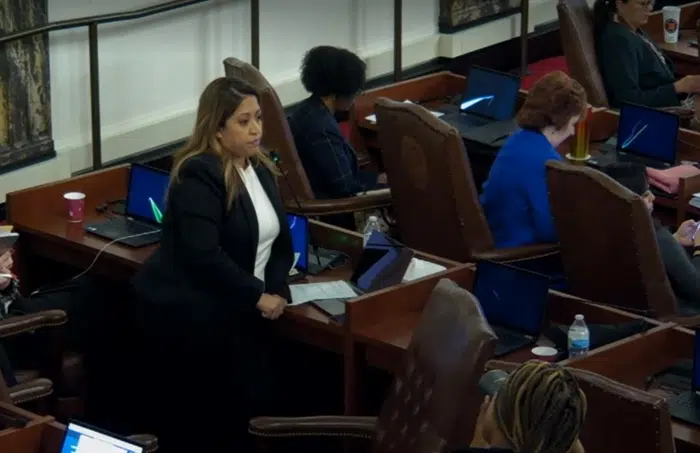Bill would also require certain insurers to provide HIV, abortion, and gender-affirming drugs without copay
By HANNAH MEISELFor Capitol News Illinoisnews@capitolnewsillinois.com
SPRINGFIELD – Democrats in the General Assembly on Tuesday approved a wide-ranging measure aimed at shoring up Illinois’ position as a “haven” for abortion access in the Midwest, including legal protections for healthcare professionals and patients traveling from states where abortion access is illegal or restricted.
Demand from out-of-state abortion seekers – particularly from neighboring Missouri – began accelerating even before the U.S. Supreme Court overturned Roe v. Wade last summer, but advocates expect even more need as Republican-controlled states further clamp down on abortion access.
To meet that future demand, Democrats included provisions in their bill meant to grow Illinois’ reproductive health care workforce, like allowing physician assistants and nurse practitioners to perform vacuum aspiration abortions – the most common type of in-clinic abortions for pregnancies up to around 14 weeks – which do not require general anesthesia.
Under the bill, Illinois would also speed the process for granting temporary permits for all doctors, physician assistants and nurse practitioners to address health care shortages in all areas, not just reproductive health care.
After a flurry of last-minute negotiations on competing bills during lawmakers’ “lame duck” session before their new terms were set to begin Wednesday, the debate turned emotional with sponsor Sen. Celina Villanueva, D-Chicago, reprimanding Republican colleague Jil Tracy of Quincy, who referred to abortion as “immoral.”
“The same God that’s looking at you is also looking at me,” Villanueva said. “And guess what? It’s the same God that’s giving me the inspiration in order to be able to do this. …You don’t get to decide what happens to my body. You don’t get to decide what happens to the bodies of a lot of different people from other states that are coming to this state seeking refuge.”
Under the bill, which Gov. JB Pritzker said he will sign, Illinois would join California, Massachusetts, and a handful of other East Coast states in establishing “shield laws” protecting information about abortions from being subject to subpoenas and orders for witness testimony issued from courts in other states.
Like the shield laws enacted by those other states, Illinois’ legal protections would also cover patients and health care professionals engaged in gender-affirming care – a practice some Republican-led states have already begun clamping down on in addition to restricting abortion access.
And if a medical professional – anyone from a physician to a pharmacist, genetic counselor, or therapist – had his or her license revoked in another state solely for performing abortions or gender-affirming care, he or she would be able to practice in Illinois, pending an investigation by Illinois’ professional licensure oversight authority.
The bill also includes liability insurance protections so that doctors coming from states where abortions or gender-affirming care is illegal can’t be charged higher rates for practicing in Illinois, based on them breaking those other states’ laws. Similarly, hospitals wouldn’t be allowed to revoke a doctor’s clinical admitting privileges due to having their license revoked in another state solely for providing abortions or gender-affirming care.
Sponsors made clear that these protections are not available to healthcare professionals accused of genuine malpractice. But Sen. Terri Bryant, R-Murphysboro, said it was ridiculous to offer protections to “lawbreakers.”
“I understand that you may not agree with whether or not [abortion] should have been illegal in other states,” Bryant said. “But the fact is that is a doctor who’s performing an illegal act in another state and we’re going to ask them to come to Illinois – and, in fact, we’re going to expedite their licenses in order to do that.”
In the House, all but three of the 71-member Democratic majority voted for the bill; Rep. Sue Scherer of Decatur has consistently voted against abortion-related bills during her time in the legislature, while two other Democratic members were absent.
The bill received unanimous support from all 41 Democrats in the Senate, despite earlier reservations from the caucus about provisions that would require insurance plans regulated by the state to cover certain medications with no copays. Those would include abortion medications typically used up to about 10 weeks of pregnancy, the HIV prevention drugs infections PrEP and PEP, as well as gender-affirming hormones.
The state doesn’t have the power to regulate most employer-provided insurance plans in the private sector, exempting those plans from the required coverage. Still, the bill would apply to thousands of individuals who buy their own health insurance or are public employees in Illinois. House sponsor Kelly Cassidy, D-Chicago, maintains the extra cost to taxpayers would be negligible, as many insurers already cover those medications without co-pays.
Additionally, if a patient is forced to go-out-of-network because their provider covered by insurance refuses to perform reproductive health care or gender-affirming care under the state’s Health Care Right of Conscience Act, the legislation requires there not be any increased cost for that out-of-network care.
Removed from the final legislation were provisions requiring university and community college campuses in Illinois to maintain at least one vending machine per campus that sells Plan B emergency contraceptives, as well as regulations for crisis pregnancy centers, facilities often run by faith-based groups designed to dissuade pregnant women from having abortions.
Brigid Leahy, vice president of Planned Parenthood of Illinois, said those two proposals are “good legislation” that her organization will push for this spring, and praised negotiators for arriving at a compromise that will “deal with the current crisis” created by soaring abortion demand in Illinois.
Capitol News Illinois is a nonprofit, nonpartisan news service covering state government. It is distributed to more than 400 newspapers statewide, as well as hundreds of radio and TV stations. It is funded primarily by the Illinois Press Foundation and the Robert R. McCormick Foundation.


